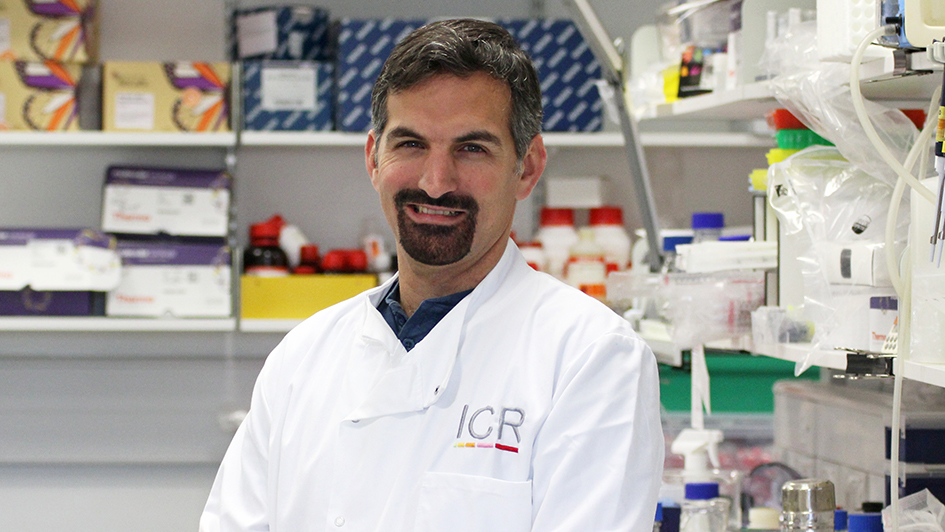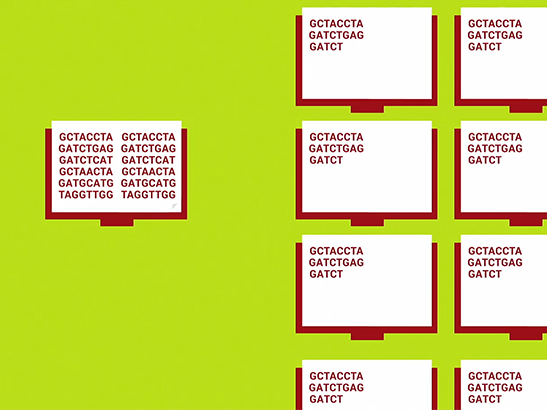
Dr Gideon Coster is one of the newest Team Leaders at the ICR. We went to meet him in his new lab inside our Chester Beatty Laboratories in Chelsea on a pleasantly mild May morning, to find out more about his research – and in true British fashion, the first thing we discuss is the weather.
“It’s cold here!” Gideon exclaimed.
With Israeli, Dutch and Brazilian heritage, I guess I can understand why he might think that.
Originally from Jerusalem, Gideon studied for his PhD in the city’s prestigious Hebrew University before moving to London in 2011 to the Clare Hall Laboratories of the London Research Institute (which later became part of the Francis Crick Institute) to carry out his postdoctoral work.
Now at the ICR, he gets to lead his own research.
“I’m trying to understand a fundamental principle that might lead to better drugs and treatments,” explained Gideon. “And that fundamental principle is relevant to all forms of cancer.”
Gideon studies the basics of DNA replication – trying to better understand the process and how it can go wrong, so he can then understand what goes wrong in cancer.
Research at the ICR is helping increase our understanding of how DNA is copied when cells divide and how this goes wrong in cancer cells – with the aim of discovering new targets for cancer drugs.
Repetitive DNA sequences
Video: Dr Gideon Coster talks about his team's work on DNA replication and how you can donate to our DNA appeal.
Our bodies are made up of trillions of cells and most of those cells are dividing and making new cells all the time. And each time a cell divides, the DNA instruction manual contained in the cell’s nucleus must be replicated to ensure the new cell gets an exact copy of the DNA in its parent cell.
Normally, this kind of cell division and replication is a tightly controlled process. But during cancer, something has gone wrong and this growth of cells is unchecked.
And crucially, when it comes to Gideon’s research, it is the errors that occur in the replication of the DNA that can be an early driver of cancer.
“I’m particularly interested in the replication of repetitive sequences of DNA,” he explained. “These parts of our genome are more difficult to replicate than others.”
And about half of the human genome is made up of repetitive DNA sequences – so that’s a lot of opportunities for errors to creep in. But why are these bits of the DNA so difficult to copy?
“We think that repetitive DNA can fold onto itself into these different unusual structures that interfere with replication.”
But, and this is why Gideon’s research is so important, we don’t actually know a lot about the process of DNA replication when it comes to trying to copy these folded, unusual structures made up of repetitive sequences.
Video: Our animation explains cell division and DNA replication and how mistakes can cause cancer.
Finding new cancer drugs
If Gideon and his team can dissect how DNA replication works, or goes wrong, when it is trying to copy those tricky repetitive sequences, maybe we’ll discover ways to stop it going wrong. And this could lead to new treatments.
Laboratory science, like Gideon’s, can appear quite distant from helping the thousands of people with cancer in the UK and around the world. But it’s this kind of research that is the driver of many of the discoveries we make when it comes to finding new drugs or other treatments.
“There’s no shortcut in research. You really do need to understand how things work – often in incredibly minute detail – if you want to get those breakthroughs that help patients further in the future,” said Gideon.
Gideon’s work will lead to a better understanding of how cancers can arise from replication errors. It could also tell us more about the way cancers grow and evolve – since cancer cells are prone to developing further errors in their DNA.
Cancer evolution is the biggest challenge we face in cancer. Gideon’s work fits in with the ICR’s ambitious plans to tackle cancer evolution in our new Centre for Cancer Drug Discovery.
We are investing an initial £75 million in creating a global centre of expertise in anti-evolution therapies – which hold the promise of outsmarting cancer to improve cure rates.
We are building a new state-of-the-art drug discovery centre to create more and better drugs for cancer patients.
Connecting work back to patients
Although his research might seem some way off from the clinic, Gideon knows the ICR is the right place for him and his research. He has thought about the clinical potential of his research and is committed to ensuring his research ultimately helps people.
“The ICR is an amazing environment for a fundamental scientist like me. I go to talks here and they’re all very clinically driven – even when researchers are doing basic science like mine, they really are connecting their work back to patients.”
“Our work could contribute to improving the diagnosis and prognosis of some cancers – such as bowel cancer, where errors in copying the repetitive sequences of DNA are common and could be an indicator of cancer progression.”
